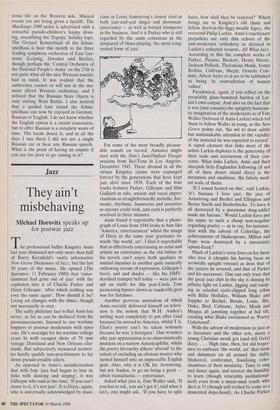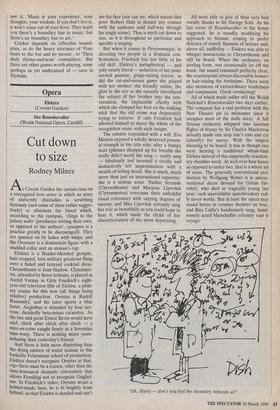Jazz
They ain't misbehaving
The professional buffer Kingsley Amis last year dismissed not only more than half of Barry Kernfield's vastly informative New Grove Dictionary of Jazz, but the last 50 years of the music. He opined (The Spectator, 11 February 1989) that 'enter- tainment had gone out of jazz' with the explosion into it of Charlie Parker and Dizzy Gillespie, 'after which nothing was ever the same again'. How should it be? Living art changes with the times, though not necessarily in step.
The sadly philistine fact is that Amis has never, as far as can be deduced from his pronouncements, listened to any wartime boppers or postwar modernists with open ears. He's nostalgic for his wartime college years lit with escapist shots of 78 rpm vintage Dixieland and New Orleans clar- inade. But subjectively treasured memor- ies hardly qualify non-practitioners to lay down pseudo-erudite edicts.
As opposed to Amis's misinformation that with bop 'jazz had begun to lose its links with dancing and singing', it was Gillespie who said at the time, 'If you can't dance to it, it's not jazz'. It is Dizzy, again, who is universally acknowledged by musi-
cians as Louis Armstrong's closest rival as both jazz-and-scat singer and showman- entertainer — as well as hottest trumpeter in the business. And it is Parker who is still regarded by the same consensus as the nonpareil of blues-playing, the most song- rooted form of jazz.
For some of the most broadly pleasur- able sounds on record, Amisites might start with the Slim's Jam/Flatfoot Floogie sessions from Bel-Tone in Los Angeles, December 1945. These abound in all the virtues Kingsley claims were expunged forever by the generations that have kept jazz alive since 1939. Each of the four tracks features Parker, Gillespie and Slim Gaillard in solo, unison and vocal impro- visations as straightforwardly melodic, har- monic, rhythmic, humorous and inventive as anyone could wish, and each is perfectly resolved in three minutes.
Amis found it regrettable that a photo- graph of Louis from 1944 looks to him like `America, entertainment' whilst the image of Dizzy in the same year gravitates to- wards 'the world, art'. I find it regrettable that so effectively entertaining an artist and artistic an entertainer as the old bibber in his novels can't enjoy both qualities as mutual impulses in another quite naturally onflowing stream of expression. Gillespie's beret, suit and shades — like his HMV- skytilted trumpet bell today — were just as apt an outfit for this post-Uncle Tom pioneering hipster-clown as vaudeville gear was for Satchmo.
Another perverse unwisdom of which Amis recently delivered himself on televi- sion is the notion that W.H. Auden's writing went completely to pot after (and because) he moved to America, whilst T.S. Eliot's poetry can't be taken seriously because he was 'a foreigner'. One wonders why jazz appreciation is so chauvinistically insistent on a narrow Americaphilia, whilst the poetry hierarchy abhors 'abroad' to the extent of excluding an obvious master who turned himself into an impeccable English gent. Also, why it is OK for Armstrong, but not Auden, to go on being a great albeit transatlantic — entertainer.
Asked what jazz is, Fats Waller said, 'If you has to ask, you ain't got it'; told what it isn't, one might ask, 'If you have to split
hairs, how shall they be restored?' Which brings me to Kingsley's old chum and fellow dyed-in-the-figgy-mould fogey, the reverend Philip Larkin. Amis's reactionary prejudices are only dim echoes of the anti-modernist orthodoxy as dictated in Larkin's collected reviews, All What Jazz. According to this the complete works of Parker, Picasso, Beckett, Henry Moore, Jackson Pollock, Thelonious Monk, Sonny Rollins, Coltrane, Shepp, Ornette Cole- man, Albert Ayler et al are to be rubbished as being 'in contradiction of human values'.
Paradoxical, again, if you reflect on the invariably glum-bummed burden of Lar- kin's own output. And also on the fact. that it was (and remains) the sprightly humanis- tic imagination of the modernists as of Fats Waller (beloved of Amis-Larkin) which led them to follow Waller in using, as the New Grove points out, 'his wit to draw subtle but unmistakable attention to the vapidity of the material he was expected to record'. A signal element that links most of the artists Larkin deplores is the generosity of their scale and seriousness of their con- cerns. What links Larkin, Amis and their sheepish little-Englandist following (if not all of their desert island discs) is the meanness and smallness, the falsely mod- est scale of theirs.
`If I sound heated on this', said Larkin, `it's because I love jazz, the jazz of Armstrong and Bechet and Ellington and Bessie Smith and Beiderbecke. To have it all destroyed by a paranoiac drug-addict made me furious.' Would Larkin have put his name to such a cheap non-sequitur regarding poetry — as to say, for instance, that with the advent of Coleridge, the achievements of Shakespeare, Milton and Pope were destroyed by a narcissistic opium-freak?
Much of Larkin's verse lives on for those who love it (despite his having been an avowedly uptight voyeur) as does that of the jazzers he revered, and that of Parker and his successors. One can only trust that the great jazz club in the sky is shining its infinite light on Larkin, jigging and vamp- ing in celestial cycle-clipped long johns with Billie Holliday, William Blake and Sappho to Bechet, Bessie, Louis, Bix, Duke, Bird, Coltrane, Ayler, Monk and Mingus all jamming together at full tilt, creating what Blake envisioned as 'Poetry Unfettered'.
With the advent of modernism in jazz as in literature and the other arts, many a young Christian monk got (and still Getz) dizzy. . . . High time, then, for old bogey- men to embrace 'the world, art' that turns and shimmers on all around the daftly blinkered, conformist, fossilising echo- chambers of their insularity. Time to sing and dance again, and recover the humility to learn (though venerably institutional- ised) even from a music-mad youth who died at 35 (though still reviled by some as a demented dope-fiend). As Charlie Parker saw it, 'Music is your experience, your thoughts, your wisdom. If you don't live it, it won't come out of your horn. They teach you there's a boundary line to music: but there's no boundary line to art.'
Cricket depends on inflexible bound- aries, as do the heavy strictures of 'Four beats to the bar and no messin', or 'Thou shalt rhyme-and-scan' committees. But there are other games worth playing, some perhaps as yet undreamed of — save in Elysium.



























































 Previous page
Previous page